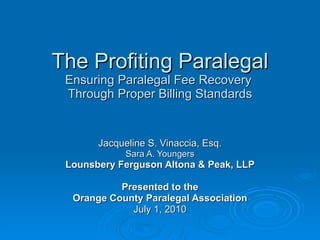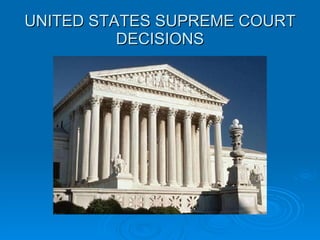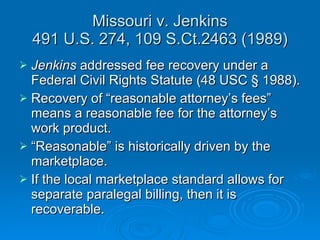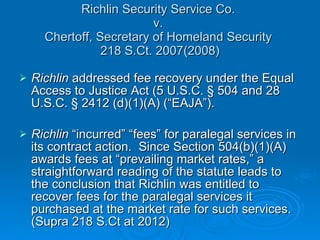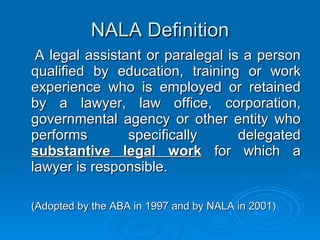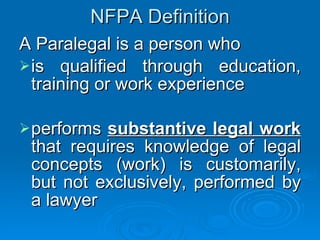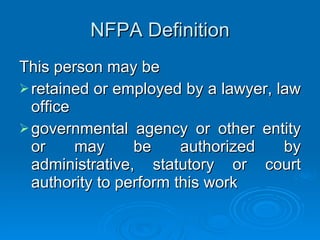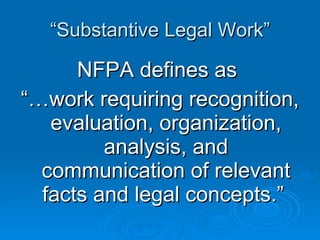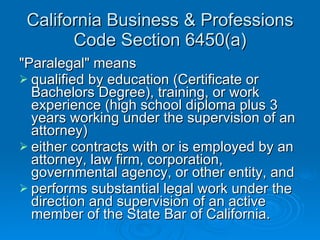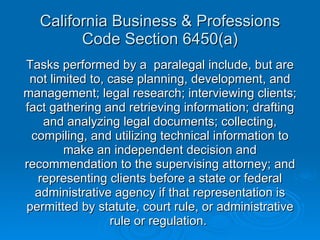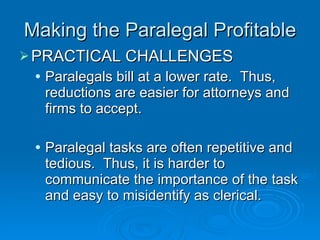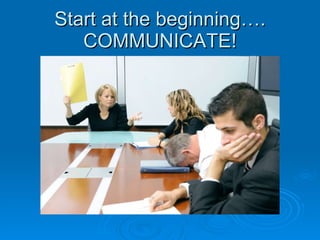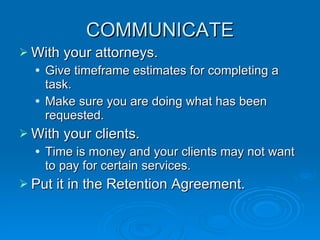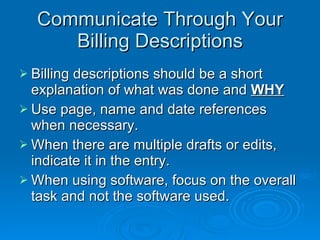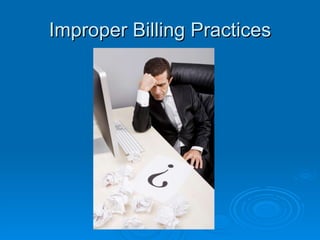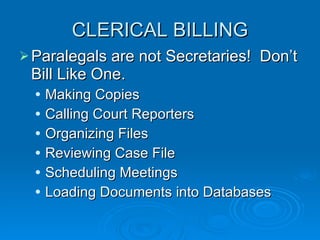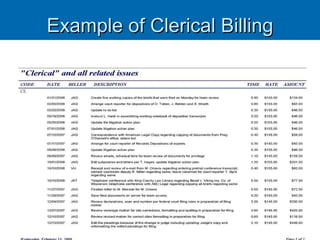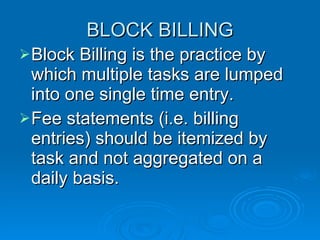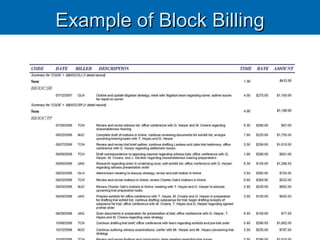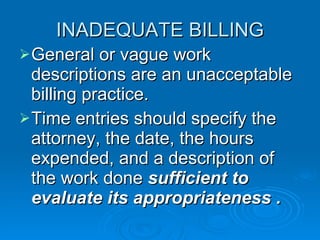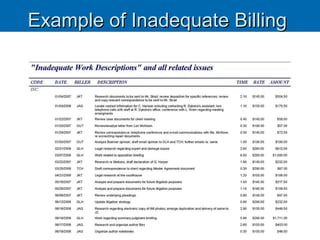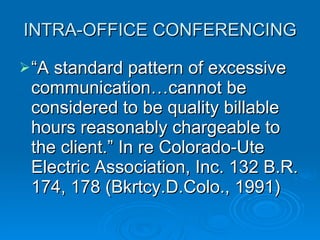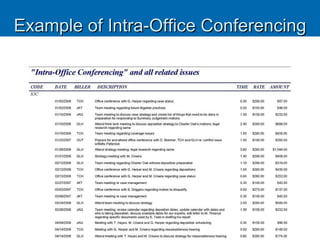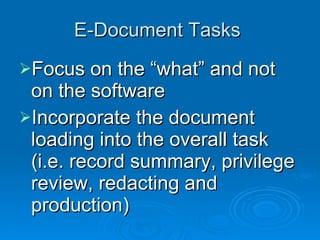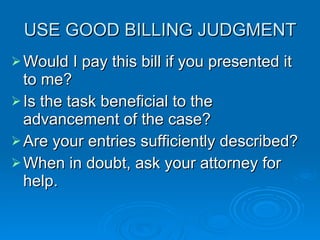The Profiting Paralegal
- 1. The Profiting Paralegal Ensuring Paralegal Fee Recovery Through Proper Billing Standards Jacqueline S. Vinaccia, Esq. Sara A. Youngers Lounsbery Ferguson Altona & Peak, LLP Presented to the Orange County Paralegal Association July 1, 2010
- 2. WE ALL NEED TO BE PROFITABLE!
- 3. UNITED STATES SUPREME COURT DECISIONS
- 4. Missouri v. Jenkins 491 U.S. 274, 109 S.Ct.2463 (1989) Jenkins addressed fee recovery under a Federal Civil Rights Statute (48 USC § 1988). Recovery of “reasonable attorney’s fees” means a reasonable fee for the attorney’s work product. “ Reasonable” is historically driven by the marketplace. If the local marketplace standard allows for separate paralegal billing, then it is recoverable.
- 5. Richlin Security Service Co. v. Chertoff, Secretary of Homeland Security 218 S.Ct. 2007(2008) Richlin addressed fee recovery under the Equal Access to Justice Act (5 U.S.C. § 504 and 28 U.S.C. § 2412 (d)(1)(A) (“EAJA”). Richlin “incurred” “fees” for paralegal services in its contract action. Since Section 504(b)(1)(A) awards fees at “prevailing market rates,” a straightforward reading of the statute leads to the conclusion that Richlin was entitled to recover fees for the paralegal services it purchased at the market rate for such services. (Supra 218 S.Ct at 2012)
- 6. NALA Definition A legal assistant or paralegal is a person qualified by education, training or work experience who is employed or retained by a lawyer, law office, corporation, governmental agency or other entity who performs specifically delegated substantive legal work for which a lawyer is responsible. (Adopted by the ABA in 1997 and by NALA in 2001)
- 7. NFPA Definition A Paralegal is a person who is qualified through education, training or work experience performs substantive legal work that requires knowledge of legal concepts (work) is customarily, but not exclusively, performed by a lawyer
- 8. NFPA Definition This person may be retained or employed by a lawyer, law office governmental agency or other entity or may be authorized by administrative, statutory or court authority to perform this work
- 9. “ Substantive Legal Work” NFPA defines as “… work requiring recognition, evaluation, organization, analysis, and communication of relevant facts and legal concepts.”
- 10. California Business & Professions Code Section 6450(a) "Paralegal" means qualified by education (Certificate or Bachelors Degree), training, or work experience (high school diploma plus 3 years working under the supervision of an attorney) either contracts with or is employed by an attorney, law firm, corporation, governmental agency, or other entity, and performs substantial legal work under the direction and supervision of an active member of the State Bar of California.
- 11. California Business & Professions Code Section 6450(a) Tasks performed by a paralegal include, but are not limited to, case planning, development, and management; legal research; interviewing clients; fact gathering and retrieving information; drafting and analyzing legal documents; collecting, compiling, and utilizing technical information to make an independent decision and recommendation to the supervising attorney; and representing clients before a state or federal administrative agency if that representation is permitted by statute, court rule, or administrative rule or regulation.
- 12. Making the Paralegal Profitable PRACTICAL CHALLENGES Paralegals bill at a lower rate. Thus, reductions are easier for attorneys and firms to accept. Paralegal tasks are often repetitive and tedious. Thus, it is harder to communicate the importance of the task and easy to misidentify as clerical.
- 13. Start at the beginning…. COMMUNICATE!
- 14. COMMUNICATE With your attorneys. Give timeframe estimates for completing a task. Make sure you are doing what has been requested. With your clients. Time is money and your clients may not want to pay for certain services. Put it in the Retention Agreement.
- 15. Communicate Through Your Billing Descriptions Billing descriptions should be a short explanation of what was done and WHY Use page, name and date references when necessary. When there are multiple drafts or edits, indicate it in the entry. When using software, focus on the overall task and not the software used.
- 17. CLERICAL BILLING Paralegals are not Secretaries! Don’t Bill Like One. Making Copies Calling Court Reporters Organizing Files Reviewing Case File Scheduling Meetings Loading Documents into Databases
- 18. Example of Clerical Billing
- 19. BLOCK BILLING Block Billing is the practice by which multiple tasks are lumped into one single time entry. Fee statements (i.e. billing entries) should be itemized by task and not aggregated on a daily basis.
- 20. Example of Block Billing
- 21. INADEQUATE BILLING General or vague work descriptions are an unacceptable billing practice. Time entries should specify the attorney, the date, the hours expended, and a description of the work done sufficient to evaluate its appropriateness .
- 22. Example of Inadequate Billing
- 23. INTRA-OFFICE CONFERENCING “ A standard pattern of excessive communication…cannot be considered to be quality billable hours reasonably chargeable to the client.” In re Colorado-Ute Electric Association, Inc. 132 B.R. 174, 178 (Bkrtcy.D.Colo., 1991)
- 24. Example of Intra-Office Conferencing
- 25. Billing in the Modern Era
- 26. E-Document Tasks Focus on the “what” and not on the software Incorporate the document loading into the overall task (i.e. record summary, privilege review, redacting and production)
- 27. USE GOOD BILLING JUDGMENT Would I pay this bill if you presented it to me? Is the task beneficial to the advancement of the case? Are your entries sufficiently described? When in doubt, ask your attorney for help.
